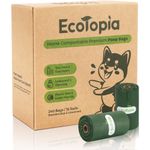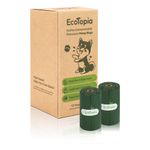In a significant move towards fostering sustainable practices, EcoTopia is proud to announce its commitment to promoting composting as an essential solution for waste management and soil health. As part of our ongoing mission to create a plastic-free future, EcoTopia believes that composting can play a pivotal role in reducing landfill waste while enriching our environment.
Understanding Composting: A Sustainable Solution
Composting is the natural process of recycling organic material, such as food scraps and yard waste, into a valuable fertilizer that can enrich soil. According to the Environmental Protection Agency (EPA), composting can divert approximately 30% of waste from landfills. This not only reduces the burden on waste management systems but also decreases greenhouse gas emissions.
"Composting is one of the most effective ways to manage organic waste and improve soil health," says Dr. Linda Thompson, an expert in sustainable agriculture. "It transforms waste into a resource, promoting a circular economy that benefits both the environment and the community."
The Benefits of Composting
Reduces Landfill Waste: Composting significantly decreases the volume of organic waste sent to landfills, which are major contributors to methane emissions—a potent greenhouse gas.
Improves Soil Health: Compost adds essential nutrients to the soil, enhances its structure, and increases its water retention capabilities. This leads to healthier plants and more robust agricultural yields.
Promotes Biodiversity: Healthy soil fosters a diverse ecosystem, supporting beneficial organisms such as earthworms and microbes that are crucial for plant growth.
Economic Savings: Communities that adopt composting programs often see reduced waste disposal costs and increased productivity in local agriculture, leading to economic benefits.
Government and Organizational Support
Many governments and organizations are recognizing the importance of composting. Several states in the U.S. have implemented policies to encourage composting practices, such as offering tax incentives for composting facilities and funding educational programs.
The USDA has also been proactive in promoting composting as a way to enhance soil health. "Composting is a fundamental practice that can help farmers improve their yields and resilience to climate change," states Secretary of Agriculture Tom Vilsack.
EcoTopia's Role in Promoting Composting
At EcoTopia, we are committed to not only providing biodegradable products but also to educating the public about composting practices. Our biodegradable trash bags are designed to be composted along with organic waste, making it easier for consumers to contribute to sustainable waste management.
We offer comprehensive resources on our website, including guides on how to set up a compost system, what materials can be composted, and tips for maintaining a healthy compost pile. "We want to empower individuals and communities to embrace composting as a viable solution for waste management," explains Abner Deng.
Community Engagement and Success Stories
EcoTopia believes in the power of community engagement to drive change. We have partnered with local schools and community organizations to host workshops on composting, providing hands-on training and resources for participants. "These workshops have been incredibly successful," says Jane Matthews, a community organizer. "People are eager to learn how they can make a difference in their own backyards."
Numerous success stories have emerged from our community initiatives. For instance, the Green City School District has implemented a composting program in their cafeterias, diverting tons of organic waste from landfills and using the resulting compost in their school gardens. "The students are learning about sustainability and seeing the direct impact of their actions," notes Superintendent Mark Jones.
The Future of Composting at EcoTopia
As EcoTopia continues to advocate for composting, we are exploring innovative ways to enhance our compostable product offerings. Our research and development team is focused on developing new materials that can break down more efficiently in composting environments.
Additionally, we are committed to expanding our educational initiatives to reach a broader audience. Our goal is to make composting accessible and practical for everyone, from urban dwellers to rural communities. "We envision a future where composting is a standard practice in households and businesses alike," states Abner Deng.
Conclusion: Join the Composting Movement
EcoTopia invites individuals, businesses, and communities to join us in our mission to promote composting as a sustainable solution for waste management. By adopting composting practices, we can collectively reduce waste, enrich our soils, and contribute to a healthier planet.





